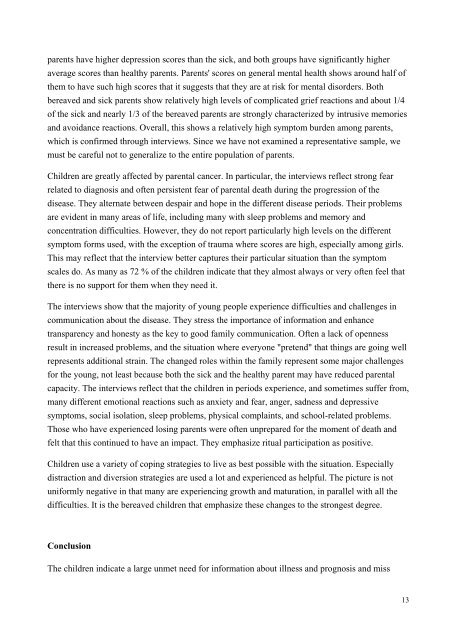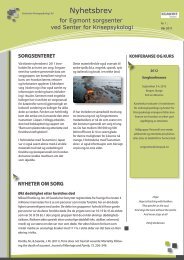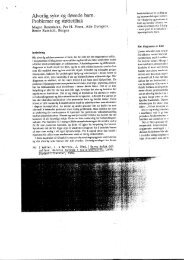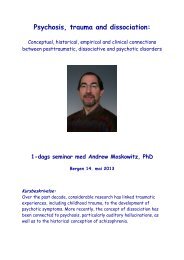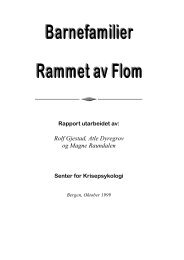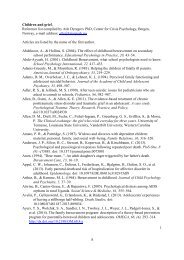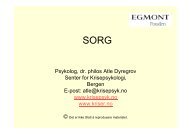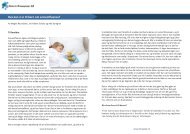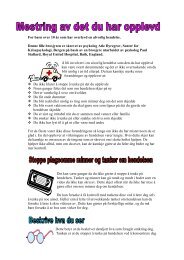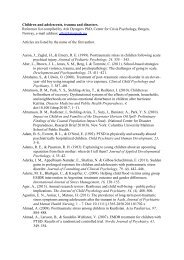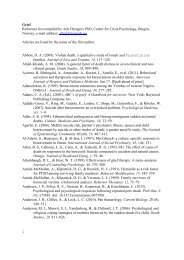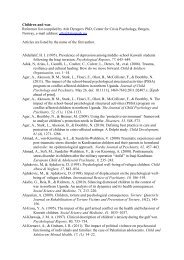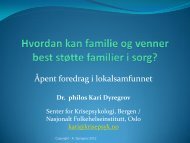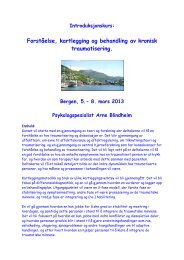Barn og unge som pårørende ved kreft - Senter for Krisepsykologi
Barn og unge som pårørende ved kreft - Senter for Krisepsykologi
Barn og unge som pårørende ved kreft - Senter for Krisepsykologi
Create successful ePaper yourself
Turn your PDF publications into a flip-book with our unique Google optimized e-Paper software.
parents have higher depression scores than the sick, and both groups have significantly higheraverage scores than healthy parents. Parents' scores on general mental health shows around half ofthem to have such high scores that it suggests that they are at risk <strong>for</strong> mental disorders. Bothberea<strong>ved</strong> and sick parents show relatively high levels of complicated grief reactions and about 1/4of the sick and nearly 1/3 of the berea<strong>ved</strong> parents are strongly characterized by intrusive memoriesand avoidance reactions. Overall, this shows a relatively high symptom burden among parents,which is confirmed through interviews. Since we have not examined a representative sample, wemust be careful not to generalize to the entire population of parents.Children are greatly affected by parental cancer. In particular, the interviews reflect strong fearrelated to diagnosis and often persistent fear of parental death during the pr<strong>og</strong>ression of thedisease. They alternate between despair and hope in the different disease periods. Their problemsare evident in many areas of life, including many with sleep problems and memory andconcentration difficulties. However, they do not report particularly high levels on the differentsymptom <strong>for</strong>ms used, with the exception of trauma where scores are high, especially among girls.This may reflect that the interview better captures their particular situation than the symptomscales do. As many as 72 % of the children indicate that they almost always or very often feel thatthere is no support <strong>for</strong> them when they need it.The interviews show that the majority of young people experience difficulties and challenges incommunication about the disease. They stress the importance of in<strong>for</strong>mation and enhancetransparency and honesty as the key to good family communication. Often a lack of opennessresult in increased problems, and the situation where everyone "pretend" that things are going wellrepresents additional strain. The changed roles within the family represent <strong>som</strong>e major challenges<strong>for</strong> the young, not least because both the sick and the healthy parent may have reduced parentalcapacity. The interviews reflect that the children in periods experience, and <strong>som</strong>etimes suffer from,many different emotional reactions such as anxiety and fear, anger, sadness and depressivesymptoms, social isolation, sleep problems, physical complaints, and school-related problems.Those who have experienced losing parents were often unprepared <strong>for</strong> the moment of death andfelt that this continued to have an impact. They emphasize ritual participation as positive.Children use a variety of coping strategies to live as best possible with the situation. Especiallydistraction and diversion strategies are used a lot and experienced as helpful. The picture is notuni<strong>for</strong>mly negative in that many are experiencing growth and maturation, in parallel with all thedifficulties. It is the berea<strong>ved</strong> children that emphasize these changes to the strongest degree.ConclusionThe children indicate a large unmet need <strong>for</strong> in<strong>for</strong>mation about illness and pr<strong>og</strong>nosis and miss13


